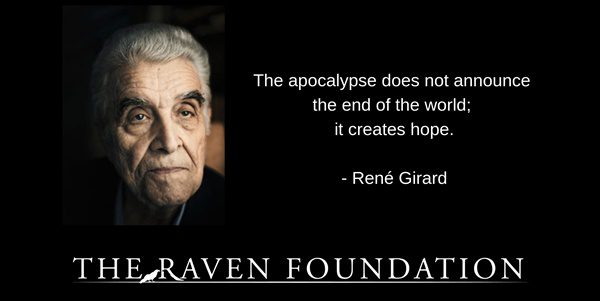Welcome to the first installment of the Girardian Virtual Bible Study. You can join Lindsey and Adam on the live Bible Study with your comments and questions on the Raven Foundation Facebook page every Wednesday morning at 10:00 am Central, 8:00 am Pacific. If you can’t make the live show, you can watch the recording or listen to the MP3 the following day here on Teaching Nonviolent Atonement. For more on the work of René Girard and the Bible, we highly recommend Paul Nuechterlein’s website Girardian Reflections on the Lectionary.
Video
MP3
Show Notes
If it is apocalyptic, it inspires hope. If it doesn’t inspire hope, it’s not apocalyptic.
But who does Apocalypse give hope to? Many claim the apocalypse gives hope only to a small number of people called “God’s elect.” For everyone else, apocalypse means utter destruction and damnation.
This notion is false. Apocalypse is an essential aspect of the Good News. And the Good News is for everyone.
Apocalypse does not mean “end of the world destruction.” It means an “unveiling” or a “revealing.” According to René Girard, Jesus reveals that God has nothing to do with violence. This means that we are responsible for violence. Girard wrote in his book, Things Hidden Since the Foundation of the World,
The theme of the Christian Apocalypse involves human terror, not divine terror: a terror that is all the more likely to triumph to the extent that humanity has done away with the sacred scarecrows humanists thought they were knocking over on their own initiative, while they reproached the Judeo-Christian tradition for striving to keep them upright. So now we are liberated. We know that we are by ourselves, with no father in the sky to punish us and interfere with our paltry business. So we must no longer look backward but forward; we must show what man is capable of. The really important apocalyptic writings say nothing except that man is responsible for his history. You wish for your dwelling to be given up to you; well then, it is given up to you. (p. 195)
It is important to know that Girard is not simply a modern Christian who is making this up. In fact, Girard’s insights about God’s nonviolence is the same insight of the ancient Christians. For them, the Apocalyptic revelation of Jesus was that God is not violent. Take chapter 7 in the Epistle of Mathetes to Diognetus, for example. This letter was written in the second or third century. It says that God sent Christ,
… as a Savior He sent Him, and as seeking to persuade, not compel us; for violence has no place in the character of God. As calling us He sent Him, not as vengefully pursuing us; as loving us He sent Him, not as judging us.
Girard’s insistence that violence has no place in God is nothing new. The ancient Christians understood this apocalyptic revelation, too.
How is this Good News? Because apocalypse does not bury our heads in the sand when it comes to violence. Rather, it names violence for what it is – the human problem that could destroy our world. While seemingly dire, the only way we can solve the problem is by naming it and accepting this truth. Only then can we be responsible for changing the way we act in the world – from violence to nonviolent love.












